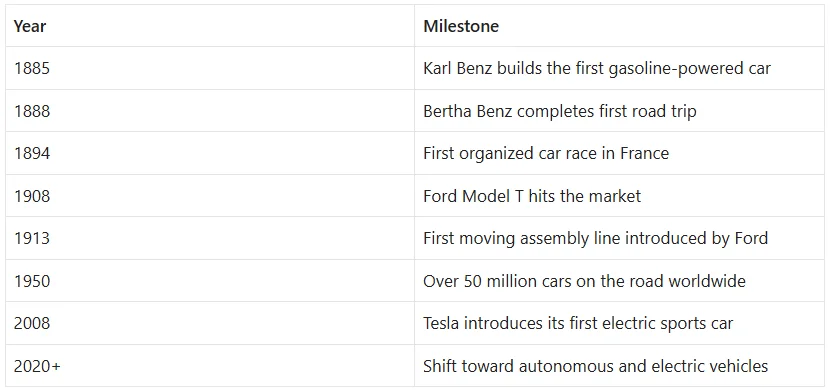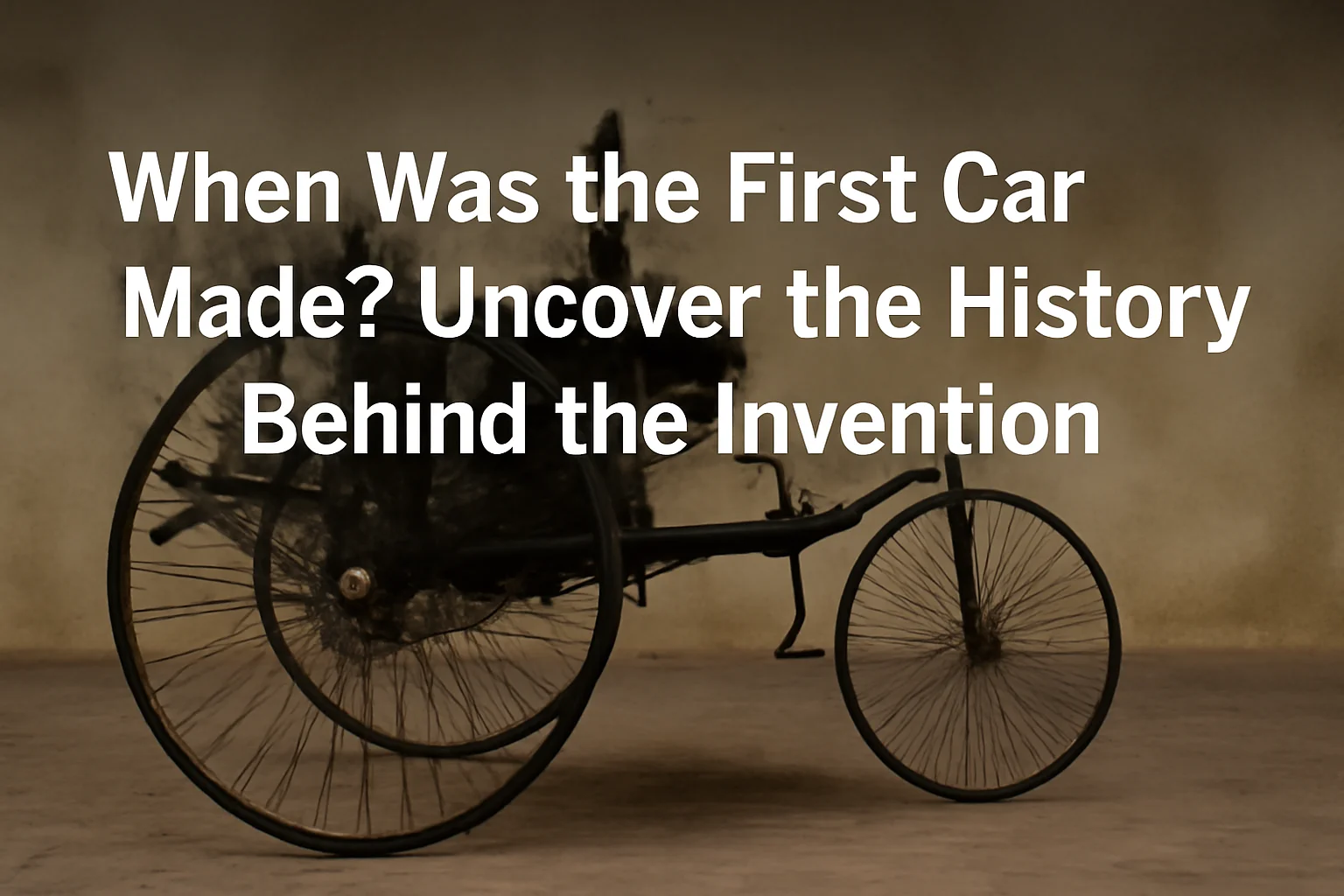Cars are so much part of our daily existence that we can barely pause to ponder The question When was the first car made? And who thought of the great idea of attaching the engine on wheels and moving it?
Well, buckle up! Since we are about to show you an easy ride on our exciting to follow the fascinating history of the first car made, the genius who made it and how the auto industry developed out of the very first spark of an ignition.
A Quick Snapshot: When Was the First Car Invented?
The very first car that most people would regard to have given rise to the modern day automobile was the car invented in 1885 by a German engineer by the name Karl Benz. The very same Benz in Mercedes-Benz.
His invention? Benz Patent-Motorwagen – the 3-wheeled car powered by a gasoline engine. It was the first history when a car was designed to be propelled using an internal combustion engine, and not some horse carriage altered.
Meet the Man Behind the Wheel: Karl Benz
Karl Benz was not just an ordinary mechanic, he was a pioneer.. Benz was born in 1844 and majored in mechanical engineering and ultimately started a company where he wanted to realise his dream of coming up with a horseless carriage, which could be fueled.
He made this dream come true in 1885 when he constructed a three wheeler vehicle with a one cylinder four stroke engine. The speed of this vehicle would be just 10 miles per hour at times when it would burst into flames. Yet, that was radical at that time!
Key Features of the Benz Patent-Motorwagen:
- One-cylinder engine
- Three wheels
- Top speed of 10 mph
- Produced of steel tubing and wood wheels.
- Driven not by a steering wheel, by a tiller.
Bertha Benz: The World’s First Road Tripper
This was a twist of its own: Karl Benz wife, Bertha Benz was the actual MVP. She made the first long distance journey in the Motorwagen in 1888–without Karl knowing!
She had to travel more than 60 miles with her sons and she made stops to refuel (which she had purchased in a drugstore), to make some fixes and even cleared a fuel line using her hatpin. Talk about girl power!
The courageous journey of Bertha served to testify to the fact that the car was safe and worked, and it became the first advertisement campaign of the car.
How Did Cars Evolve After That?
Once the motorwagen made its debut to the market, inventors all over the world took the opportunity to hop on the train. We can deconstruct the history of how the auto industry was built over the decades.
1890s – The Rise of Car Companies:
- Other inventors such as Gottlieb Daimler and Wilhelm Maybach (yes, the same Maybach) had been working on gasoline powered cars.
- In 1886, Daimler invented a four-wheeled car, approximately at the same time as Benz.
- In 1894 the first car race was conducted in France – speed was the new mania.
1900s – Mass Production Changes the Game:
- Henry Ford in 1908 launched the first car, the model T, which was affordable to an average person.
- Ford did not invent the car; however, he invented assembly line production that made cars cheaper and easy to manufacture.
1920s–1950s – Cars Go Global:
- Automobiles were distributed throughout the globe, and manufacturers such as Fiat, Renault, Toyota, and Volkswagen came up.
- The styles, sizes and power were enhanced quickly.
1960s–1980s – Design, Speed, and Innovation:
- There was the introduction of muscle cars, compact cars, and some other innovations such as power steering, automatic transmission, and safety features becoming a norm.
- People were purchasing cars not only to get transportation, but also to have status and enjoyment.
1990s–Today – The Era of Technology and EVs:
- Current cars are mechanical engineering, computer software and AI.
- Other companies such as Tesla have changed the game to electric cars.
- The current automobiles are self-driving, have touchscreens, and over-the-air software updates.
Timeline: Key Moments in Car History

What Was Used Before Cars?
Prior to cars, people relied mostly on horses, carriages and bicycles. In the early 1800s, the steam-powered vehicles were in existence but they were cumbersome, slow and not very useful in the day-to-day life.
Interesting Facts About the First Car
- Fuel Type: The earliest Motorwagen used ligores a type of petroleum that was used as fuel.
- License Plate: Karl Benz had no license, cars were so new that there were no laws yet
- Brakes: It was half-way through the trip before Bertha had to stop and put on some leather to the brake pads!
- Noise: The initial automobiles were noisy and smoky. Human beings believed that they were evil machines.
How Has the Purpose of Cars Changed?
The car at the time was an experiment and a luxury. Today, it’s a necessity. Cars have become more than merely means of transport:
- Mobile offices
- Entertainment systems
- Eco-friendly solutions
- The icons of liberty and way of life.
6 Types of Modern Cars (and Where They Came From)
- Gasoline Cars – The OGs. Evolved from Benz’s model.
- Diesel Cars – Designed to be a faster, more fuel efficient car.
- Electric Cars – Tesla reinvents the first experiments of the 1800s.
- Hybrid Cars – Hybrid (gas+electric, such as Toyota Prius).
- Self-driving technology – Autonomous Cars are coming true.
Hydrogen Cars: The next generation of clean fuel?
Who invented the first car?
The first actual car was invented in 1885 – the Benz Patent-Motorwagen and this was credited to Karl Benz.
When did cars become popular?
The popularity of cars occurred after 1908 when Henry Ford unveiled the affordable model T that made the cars affordable to the common person.
What was the top speed on the original car?
Benz Patent-Motorwagen had a top speed of approximately 10 mph (16 km/h).
Conclusion
So, when was the first car made? In 1885, by Karl Benz. The trip of the car was not over though it was only beginning. Cars have influenced our lifestyle, work, and traveling, starting with the clumsy three-wheelers, then moving on to AI-driven electric transport.
The car was not invented simply to be a mechanical accomplishment. It was a human one. An innovation, risk, and passion story. And honestly? It’s far from over.

